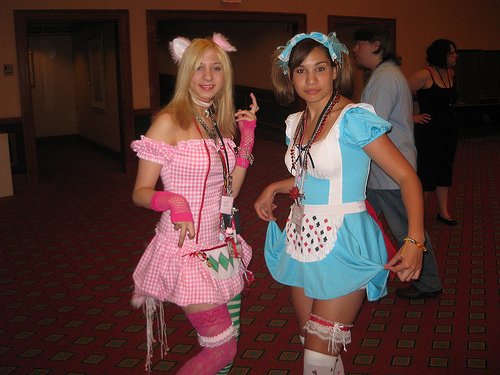Well, I’m back in Japan now, the land of sushi and small cars and very cute things. No matter how often I zip between the U.S. and Japan it always takes a couple hours to get used to my new environment, and I like to sit back and “surf” the various shades of culture shock that wash over me (no doubt helped along by jet lag). As I stepped off the plane this time, I was immediately hit by the sticky, wet heat that is Japan’s June rainy season, an unfortunate aspect of living here. There was a small mix-up with one of my packages not appearing on the baggage carousel, which was resolved by three Narita airport employees who did their jobs so professionally I was actually unable to speak, so great was my awe while watching them. The Japanese are big fans of 24-hour time, and as I rushed for my “Limousine Bus” (a very comfortable bus from the airport) I had to mentally convert the military time of 17:15 to 5:15 PM, something I hadn’t had to do while in the U.S. Once I was safely on the bus for my home prefecture, I took in my surroundings. Sitting in the seat across from me was a young woman who was dressed so stylishly, with her little hat and color-coordinated nonsensical-English T-shirt and designer sunglasses, that she seemed like some kind of mannequin in a high-class department store. I knew I was back in Japan…
Every language has dialects (in Japanese, hougen, hoh-GEN with a hard “g”), and Japan is no different. I’ve heard that, since Japanese are more likely to stay in the same place all their lives, or move to Tokyo for work or education then do a “U-turn” back to their home prefecture soon after, Japan’s dialects have a lot more variation to them than North American English. Often dialects are used to add a new dimension to a character in anime, and if you have a group of females in a given show, you can bet there’ll be one whose “charm point” is speaking some cute but odd-sounding flavor of Japanese. Usually the subject of dialects is discarded when an anime series is dubbed into English, but not always: in Magic Knight Rayearth, a favorite of mine, there’s a country called Chizeta where all the people speak Osaka-ben, which was (of course) brought over as Deep Southern (“y’all”) in English. Another favorite anime of mine is Studio Ghibli’s Ocean Waves, the story of a Tokyo girl who goes to live with her mother in Kochi Prefecture, on the fourth-largest Japanese island of Shikoku, after her parents’ divorce. She has trouble getting along with the other kids in school in part because of the differences between Kochi dialect and standard (Tokyo) Japanese, and she offends the boy she likes by saying he talks like he’s in a Samurai drama on TV. Beyond the famous major dialects of Japanese — comical Osaka-ben, eerily polite Kyoto-ben, Gaelic-sounding Tohoku-ben from Northern Japan — I’ve noticed an “artificial” dialect of the language. It’s not uncommon for radio DJs to use gaijin-ben, speaking English-accented Japanese as if they were foreigners, complete with the over-inflected sentences that gaijin are known for. I guess it sounds “chic” to their listeners.
It’s always fun to analyze how perceptions differ between two countries like Japan and the U.S. To me, my eyes are hazel-blue while the eyes of Japanese people are brown, but that same Japanese will tell you that their eyes are “black” (because the center of everyone’s eyes are black). In the U.S., we refer to the # key on a phone as the pound key, but in Japan it’s known by its musical notation name of “sharp.” Up until World War II, many Japanese counted their ages from “1” starting at the point of birth (as opposed to 0), and many older Japanese still report their age according to this system, making their ages a year off from how it’s calculated normally. Finally, there’s our coffee maker, a large-capacity Mr. Coffee job from the States (since Japanese stores sell wuss coffee makers fit only for Hobbits). The switch to turn it on shows 0 and 1, and it’s pretty clear to most of us that 1 means “on” and 0 means “off.” However in Japan, a circle (“maru”) is the universal symbol for “yes” and our Japanese staff invariably try making coffee by turning the switch to this setting, then wondering why nothing happens.
We’ve started a new section at J-List: PC Dating-sim Game of the Month, where we’ll showcase a certain game and make it available at a special price for that month only. This month’s selection is Casual Romance Club, a game that’s kind of in a class by itself since it was released in Japan with the ability to choose either English or Japanese game text, as well as English or Japanese voices (love those Japanese-English accents). Featuring a large box and the most beautiful printed manual you’ll ever see (a glossy art book featuring character info and game art), this is a superb game with twelve unique characters (each representing a sign of the Zodiac, naturally) and some of the best gameplay ever. It’s a very large game, approx. 3 GB, installed on your PC from a DVD-ROM. On sale at a special price ($10 off) for a limited time now! “Suddenly, without warning, love takes you by surprise…”
















